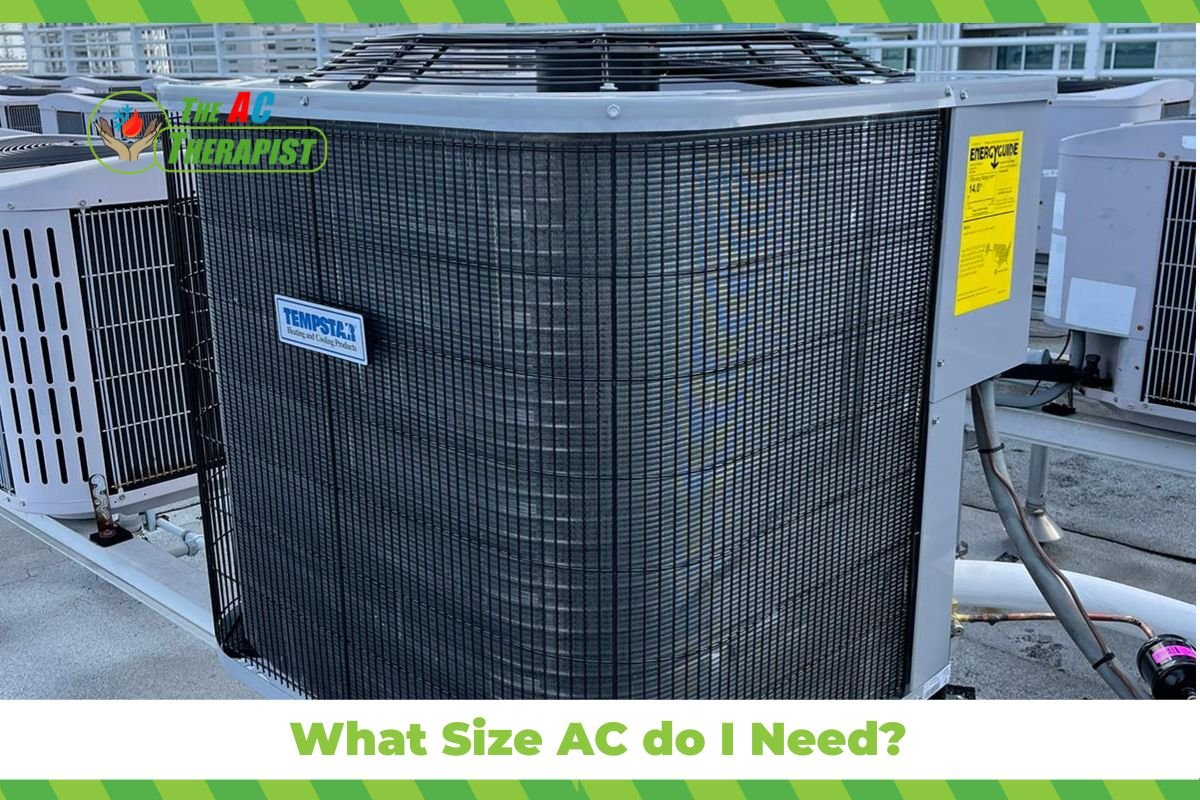What Size AC do I Need?
As the temperature rises during the hot summer months, so does the demand for air conditioners (ACs) to provide much-needed relief.
However, before you make a purchase, it is crucial to find the perfect AC size for your space. An improperly sized AC unit can lead to insufficient cooling, excessive energy consumption, and increased wear and tear on the system.
In this comprehensive guide, we will delve into the factors that determine the right AC size and provide practical advice for making an informed decision.
[CP_CALCULATED_FIELDS id=”6″] |
Why is it Important to have the right size AC?
Having the right size AC is crucial for several reasons:
- Comfort: A properly sized air conditioner will effectively cool your space, maintaining a comfortable temperature during hot weather. An undersized AC unit will struggle to cool the area, while an oversized one may cause temperature fluctuations.
- Energy efficiency: An appropriately sized AC unit will operate at its optimum efficiency, leading to lower energy consumption and reduced utility bills. An oversized unit will cycle on and off frequently, consuming more energy, while an undersized unit will run continuously, struggling to reach the desired temperature.
- Humidity control: A correctly sized AC unit not only cools the air but also helps maintain optimal humidity levels. Oversized units may cool the space too quickly, not allowing enough time to dehumidify the air, resulting in a clammy and uncomfortable environment.
- System longevity: An AC unit that is either too small or too large for the space will experience increased wear and tear due to continuous operation (undersized) or frequent on-off cycling (oversized). This can result in shorter system lifespans, more frequent repairs, and higher maintenance costs.
- Cost-effectiveness: Investing in the right size AC ensures that you are not paying for unnecessary cooling capacity. A larger unit may have a higher upfront cost and consume more energy, while a smaller unit may need to be replaced sooner due to decreased efficiency and increased wear and tear.
By choosing the right size air conditioner for your needs, you can ensure optimal comfort, energy efficiency, and system longevity, ultimately saving money and providing a more enjoyable living environment.
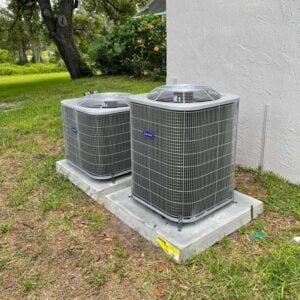
What happens if my AC is Too Big or Too Small for my House?
An improperly sized air conditioning system can cause several issues for your home. Here’s what can happen if your AC is too big or too small for your house:
If your AC is too big:
- Short cycling: An oversized AC unit will cool your home too quickly, causing it to frequently cycle on and off. This short cycling increases wear and tear on the system, reduces its lifespan, and can lead to more frequent repairs.
- Inadequate dehumidification: A larger AC unit may cool your home quickly but will not have enough time to effectively remove humidity from the air. This can lead to a damp, clammy indoor environment, encouraging mold and mildew growth.
- Energy inefficiency: A system that is too large will consume more energy than necessary, leading to increased energy bills and a larger carbon footprint.
- Uneven cooling: Oversized AC systems might cause some areas of your home to feel too cold, while others remain too warm, leading to discomfort and dissatisfaction.
If your AC is too small:
- Insufficient cooling: An undersized AC unit will struggle to maintain a comfortable temperature in your home, especially during hot summer days. This can result in an uncomfortably warm indoor environment.
- Overworking: A smaller AC system will have to work harder and run for longer periods to try to maintain the desired temperature, which can lead to increased wear and tear, reduced lifespan, and potential system failures.
- Energy inefficiency: Similar to an oversized system, an undersized AC unit will also consume more energy due to its continuous operation, leading to higher energy bills.
- Uneven cooling: Just like an oversized unit, an undersized AC system may struggle to cool your home evenly, causing temperature inconsistencies throughout the house.
To avoid these issues and ensure optimal performance, it is essential to select the correct size air conditioning system for your home. Consult with a professional HVAC technician for a proper assessment and accurate sizing recommendations.
How to size the right AC for your home:
Understanding BTUs and Tonnage
Understanding BTUs and tonnage is essential when selecting the right air conditioner size for your space. These terms help quantify the cooling capacity of an AC unit, ensuring that it is adequate for your needs.
- British Thermal Units (BTUs): A British Thermal Unit (BTU) is a unit of energy that measures the amount of heat required to raise the temperature of one pound of water by one degree Fahrenheit. In the context of air conditioners, BTUs are used to express the amount of heat an AC unit can remove from a space per hour. The higher the BTU rating, the more cooling capacity the air conditioner has.
- Tonnage: Tonnage is another unit of measurement used to describe the cooling capacity of an AC system. One ton of cooling capacity is equal to 12,000 BTUs per hour. Tonnage is commonly used to categorize central air conditioning systems, while BTUs are more frequently used for window or portable units. Residential AC systems typically range from 1 to 5 tons, although larger systems may be necessary for commercial applications.
Understanding the BTU and tonnage requirements for your space is crucial when selecting the right air conditioner. By calculating the necessary cooling capacity based on factors such as room size, insulation, climate, and other variables, you can choose an AC unit that provides optimal comfort and energy efficiency.
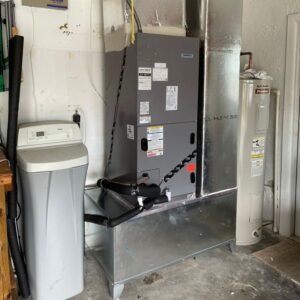
Calculating the Required BTUs
To calculate the required BTUs for your space, consider these primary factors:
a. Room size: Measure the length, width, and height of the room, and then multiply these dimensions to find the cubic feet. As a general rule, you will need roughly 30 BTUs per square foot of living space.
b. Insulation: Well-insulated spaces require fewer BTUs to cool. Evaluate the insulation in your walls, attic, and windows to determine if you need to adjust the BTUs accordingly.
c. Climate: Areas with hotter climates will require more BTUs. Consult climate zone maps to determine the average temperature for your region during the summer months.
d. Occupancy: Each person in a room generates heat. For every additional person above two occupants, add 600 BTUs to your calculation. This mostly applies to commercial settings.
e. Appliances and Electronics: Appliances and electronics generate heat, so consider the heat output from devices such as ovens, computers, and televisions when calculating the BTUs required.
Doing the Math
When sizing your AC system, you have two primary options: room-by-room sizing or whole-house sizing.
a. Room-by-Room Sizing: This method involves calculating the BTUs required for each room and then selecting individual AC units for each space. This approach allows for greater customization and can be more energy-efficient in homes with rooms that are seldom used.
b. Whole-House Sizing: This approach calculates the total BTUs required for the entire house and then selects a central AC system with the appropriate capacity. This method ensures consistent temperatures throughout the home but may be less energy-efficient if some rooms are unused or have different cooling requirements.
Table of Central AC Sizing:
| Home Size (sq ft) | Base BTUs | Well-Insulated BTUs | Poorly Insulated BTUs | AC Size (tons) |
|---|---|---|---|---|
| 600 | 18,000 | 16,200 | 19,800 | 1.5 |
| 800 | 24,000 | 21,600 | 26,400 | 2 |
| 1,000 | 30,000 | 27,000 | 33,000 | 2.5 |
| 1,200 | 36,000 | 32,400 | 39,600 | 3 |
| 1,400 | 42,000 | 37,800 | 46,200 | 3.5 |
| 1,600 | 48,000 | 43,200 | 52,800 | 4 |
| 2,000 | 60,000 | 54,000 | 66,000 | 5 |
This table provides a rough estimate for central AC sizing based on home square footage using a multiplier of 30 BTUs per sq ft, used here in Tampa Bay, Florida. Keep in mind that it is essential to consider additional factors such as climate, window placement, and ductwork when selecting the appropriate AC size. Consulting with a professional HVAC technician for a more accurate assessment is highly recommended.
[CP_CALCULATED_FIELDS id=”6″] |
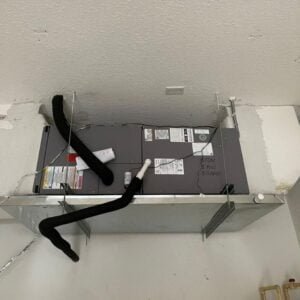
The Importance of Energy Efficiency
Energy efficiency is a crucial consideration when selecting an air conditioner, as it can have a significant impact on your utility bills, overall comfort, and environmental footprint. Here are some reasons why energy efficiency is important when choosing an AC unit:
- Lower energy bills: An energy-efficient air conditioner consumes less electricity to provide the same amount of cooling as a less efficient unit. This results in lower energy bills, helping you save money in the long run.
- Consistent comfort: Energy-efficient air conditioners are designed to maintain consistent temperatures and humidity levels in your space. This ensures optimal comfort and creates a more pleasant living environment.
- Reduced environmental impact: By consuming less energy, an efficient air conditioner generates fewer greenhouse gas emissions, which contribute to climate change. Choosing an energy-efficient AC unit is a responsible choice that helps reduce your carbon footprint.
- Extended lifespan: Energy-efficient AC systems often have better-quality components and more advanced technology, which can contribute to a longer lifespan. This means fewer replacements and repairs over time, saving you money and resources in the long run.
- Incentives and rebates: Many governments and utility companies offer incentives, rebates, or tax credits for purchasing energy-efficient appliances, including air conditioners. These financial incentives can help offset the initial cost of an energy-efficient AC unit.
When selecting an air conditioner, look for systems with a high Seasonal Energy Efficiency Ratio (SEER) rating. The SEER rating measures the cooling output per energy input during a typical cooling season. A higher SEER rating indicates a more energy-efficient system. In the United States, the minimum SEER rating for new central air conditioners is 14 or 15, depending on the region, but higher ratings (up to 26) are available for even greater efficiency.
In summary, choosing an energy-efficient air conditioner is an investment in long-term savings, comfort, and environmental responsibility. By prioritizing energy efficiency, you can enjoy the benefits of a well-cooled space without the drawbacks of excessive energy consumption and environmental impact.
Consult with a Professional
Consulting with a professional HVAC technician is highly recommended when selecting the right air conditioner size for your space. Although online guides and self-assessment tools can provide a general overview of AC sizing, a professional can offer a more accurate and personalized evaluation. Here are some reasons why consulting with a professional is important:
- Expertise: HVAC professionals have the training and experience to assess your home’s unique characteristics, such as insulation, window placement, and shading, which can all impact the cooling requirements of your space.
- Customized solutions: A professional can evaluate your home’s layout and specific needs, providing tailored recommendations for AC size and system type, whether it’s a central air conditioner, ductless mini-split, or window unit.
- Ductwork evaluation: If you’re considering a central air conditioning system, an HVAC professional can inspect your existing ductwork to ensure it’s properly sealed, sized, and maintained. This will help your AC system run more efficiently and provide better cooling performance.
- Proper installation: A professional HVAC technician can ensure that your new air conditioner is installed correctly, which is essential for optimal performance, energy efficiency, and system longevity.
- Warranty and maintenance: Many AC manufacturers require professional installation and maintenance to maintain the warranty on their products. By working with a professional, you can protect your investment and ensure your air conditioner is well-maintained for years to come.
In summary, consulting with a professional HVAC technician when selecting the right air conditioner size can save you time, money, and headaches in the long run. Their expertise and personalized recommendations will help you make an informed decision and enjoy optimal comfort and energy efficiency in your space.
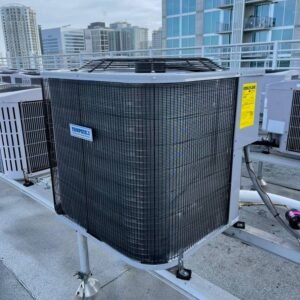
Dehumidification and the Pitfalls of Oversized AC Units
Air conditioning systems play a significant role in controlling indoor humidity levels by dehumidifying the air as they cool it. When an air conditioner operates, it removes heat and moisture from the indoor air, making your home more comfortable. Here’s how the process works:
- The AC system draws warm, humid air from your home and passes it over the evaporator coil, which is cooled by refrigerant.
- As the warm air comes into contact with the cold coil, the air cools down, and its ability to hold moisture decreases.
- This causes the excess moisture to condense on the coil, effectively removing it from the air.
- The cooled, dehumidified air is then circulated back into your home, while the collected moisture is drained away through the condensate drain.
An oversized air conditioning unit can negatively impact the dehumidification process and cause several issues, such as:
- Short cycling: A larger AC unit cools your home too quickly, resulting in frequent on-and-off cycling. This short cycling doesn’t allow enough time for the system to effectively remove moisture from the air, leaving your indoor environment humid.
- High humidity levels: When your AC system does not adequately dehumidify your home, you may experience higher indoor humidity levels, which can make your living environment uncomfortable and sticky.
- Mold and mildew growth: Excess humidity encourages the growth of mold and mildew, which can pose health risks, produce unpleasant odors, and damage your home’s structure and belongings.
- Condensation on windows and surfaces: High humidity levels can cause condensation on windows, walls, and other surfaces, potentially leading to wood rot, peeling paint, and other structural damages.
- Increased energy consumption: If your AC system does not effectively control humidity, you might feel the need to lower the temperature setting to counteract the uncomfortable humidity, leading to increased energy consumption and higher energy bills.
To avoid these issues and maintain optimal indoor humidity levels, it is crucial to select the correct size air conditioning system for your home. Consult with a professional HVAC technician who can assess your current system and recommend appropriate solutions, such as resizing the AC system, adding a dedicated dehumidifier, or improving your home’s insulation and sealing.
Overworking and the Pitfalls of an Undersized AC Unit
An undersized air conditioning unit has to work harder and run longer to maintain the desired temperature, leading to increased wear and tear on the system. This overworking can cause the AC unit to wear out more quickly than it was designed to, leading to more frequent breakdowns and costly repairs.
When an AC system runs continuously, it experiences greater stress on its components, such as the compressor, fan motor, and condenser coil. This constant strain can cause these parts to malfunction or fail prematurely, reducing the lifespan of the unit. Additionally, when an AC unit is undersized, it may struggle to keep up with the cooling demand, causing it to run for longer periods, further increasing the strain on its components.
An overworked AC unit can also cause the refrigerant to break down more quickly, leading to potential leaks and reduced cooling performance. Furthermore, an undersized unit can cause the evaporator coil to freeze up, further reducing its ability to cool your home effectively.
If an undersized AC unit is not replaced promptly, it can lead to frequent breakdowns, costly repairs, and ultimately a shortened lifespan. To avoid these issues, homeowners should ensure that they select the correct size AC unit for their home and seek professional advice if they are unsure. A professional HVAC technician can accurately assess the cooling requirements of your home and recommend the appropriate size unit to ensure optimal performance and longevity.
Unlocking Optimal Home Comfort: Why AC Therapist is Your Ultimate HVAC Solution
In conclusion, selecting the correct size for your air conditioning unit is essential for maintaining a comfortable and energy-efficient home. By understanding factors like BTUs, tonnage, insulation, and climate, homeowners can make more informed decisions when choosing an AC system. However, it is crucial to remember that calculating the ideal AC size is only part of the equation. Proper installation, regular maintenance, and an energy-efficient home environment all contribute to the overall performance of your air conditioning system.
To ensure that you receive the best possible advice and service, we highly recommend consulting with a professional HVAC technician such as The AC Therapist. With years of experience and a team of skilled experts, The AC Therapist can provide comprehensive assessments, tailored solutions, and exceptional customer care. Their deep understanding of the complexities involved in air conditioning systems allows them to accurately determine the optimal AC size for your specific needs, ensuring maximum comfort and energy efficiency.
By working with The AC Therapist, you can enjoy the benefits of a well-designed, professionally installed, and properly maintained air conditioning system. Their commitment to quality service and customer satisfaction will help you achieve a comfortable living environment while minimizing energy costs and reducing your carbon footprint. Don’t leave your home comfort to chance – contact AC Therapist today to schedule a consultation and take the first step toward a cooler, more comfortable, and energy-efficient home.

